Last updated on September 4th, 2024
Featured image: Regenerative thinking starts with understanding that we are not separate from the earth/ Photo by vladans on Envato
Why We Need to Shift our Mindset – Now
by Carolyn Ray
At age 15, Anna Pollock was put on a train in Victoria Station with a ticket to Stuttgart, Germany, on a school exchange. Fearless and excited, this first ‘solo’ trip kickstarted a lifelong passion for discovery and exploration, which eventually took her to Northern Labrador in Canada as a member of Voluntary Service Overseas, the English version of Peace Corps in 1967 and then to New Zealand where she was one of two women in the post-graduate geography program at University of Canterbury in the 1970s.
“I’ve been so blessed to have been able to travel overland back in the days when there was no Internet, there weren’t even telephones,” she says. “In Labrador, I had one telephone call back home in a year. When travelling back from New Zealand overland throughout southeast Asia in 1973, every next place we stopped presented a different language, culture and food. There was no westernization of any substantial amount. That kind of travelling is just not possible now. It was wonderful.”
A new way of ‘seeing and being’
It was during her travels in Bali that Pollock realized there were many other ways of ‘seeing and being’ in the world.
“The biggest change for me was in Bali,” she says. “Not just because it was such a beautiful place, but the culture, which was so alive, strong and healthy, was based on a fundamentally different set of assumptions to those I had grown up with. The art, the music, the dance, the inner and outer beauty and grace of the people, and the lush landscape were captivating. For a Western white middle-class educated English girl, the deep immersion was transformational. It kindled a lifelong interest in indigenous philosophies. It was like whoa’, a moment when familiar, solid beliefs were shaken thoroughly.”
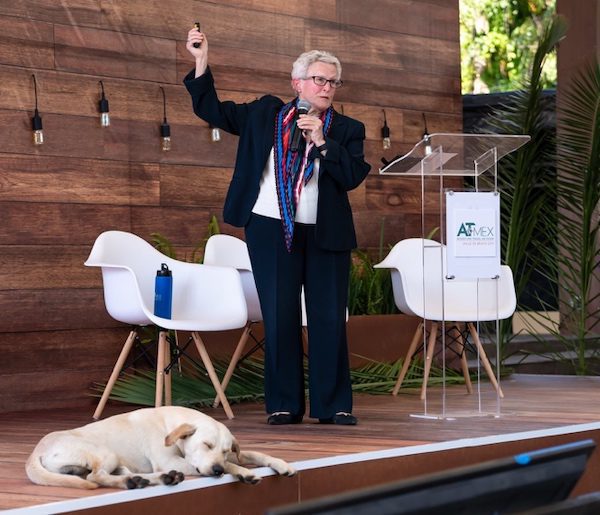
Presentation to ATMEX 2019, Valle de Bravo, Mexico
But what is regenerative thinking, and how is it different – or connected – to sustainability?
“Regeneration encompasses sustainable practices but takes our relationship with nature to a higher level.,’ she says. “Regenerative thinking also addresses the root cause of the current crises besetting humanity at present, which is that we genuinely believe that we are separate and somehow superior to the natural world.
“One of the things that I realized as a result of receiving this award is that I didn’t have the right anymore to be shy, or the right to not say I’m good enough; or the right to therefore, in a sense, mute my voice.” — Anna Pollock
For some right now, the environment is perceived as a problem, an “it” that we have to fix. Our current language reveals that we currently see the world as a machine that we can control and manipulate when we are in fact an integral part of a highly complex, dynamic living system – Nature – where there are no boundaries, no real edges; where everything that we do affects everything else and is being affected by the context in which we exist.”
The Role of Women in Our World: My Q&A with Anna
Shortly after presenting Pollock with the JourneyWoman Award at the Women in Travel Summit, I interviewed her in her home outside of London, UK via zoom from Mexico, a country she has spent a great deal of time in, most recently in the Chiapas region.
Here are some edited highlights from our conversation.
Where are we heading and what needs to change?
Our shared reality is to be living at one of the most exciting but scary times in history. I would argue that the framework or the worldview through which we make sense of our world is a western one. It’s not the only one, but it has become the dominant one. As a result, we think there is only one way of seeing the world — and that’s the western way. It’s the scientific way. It’s the rational way. It’s the way that works economically, et cetera, et cetera.
Nevertheless, the truth is that this way of seeing the world, which has affected our values, and our behaviour, has brought us to the end of the road. We have to change that.
A lot of people think that some of the ideas that we’re now proposing around regeneration are new, they are not. In Bali in the 1970s, the Balinese culture and belief system shaped every aspect of their life They were managing their rice paddies through their relationship with their Gods and the rituals they did in the top of the mountain. To a western mind those rituals were superficial thinking the success of their farming system based on nothing but skilled engineering. But that wasn’t the case at all.
“We’re asked to make an evolutionary leap in a very short period of time consciously, and that is a very tall order. And the jury’s out whether we’ll make it or not.” — Anna Pollock
What’s the difference – or connection – between ‘sustainability’ and ‘regeneration’, which seems to have become the latest buzzword?
Sustainability is about sustaining something. It recognizes that we have an impact on the natural world, that we are polluting it, that we are overusing, we are wasteful. It involves a set of practices that shrink that negative impact.
Sustainability focuses on doing less of the things that were damaging it, whatever “it” is. For some people, it’s sustaining a healthy environment; for others it’s sustaining our way of life or our ability to survive even. I just wish more people would tell us what they’re sustaining first.
However, sustainability doesn’t go the next step, which is to ask why are we doing that. What are the underlying assumptions we’ve applied that have resulted in the challenges we now face.
Regeneration goes two steps further. First of all, it says it’s not enough to cut back, shrink our impact, shrink our footprint, reduce emissions. We have to acknowledge the fact that the damage that we’ve done has accumulated and there is some healing to be done, there is some restoration to be done. We must start to bring the land back to life and bring it back to health AND that involves changing the way we understand how life really works.
Regeneration says, “How do we become so much more aware of nature’s ways, her principles, her rules that we can work in partnership with her so that our systems do what life does and create the conditions for all life to thrive; not just human life but all life. I resist defining the concept any more tightly than that because the act of defining is to confine or separate some “thing” or part when reality is all about flows, wholes and relationships. All boundaries in Nature are permeable.
Regeneration involves a way of thinking that asks us to retain the whole picture in mind so we can see the connections and relationships that create the conditions for life to thrive.
Addressing root cause involves realizing that reality/life is one enormous interconnected, interdependent whole. You and I aren’t as separate as we think. What you do affects me, it just has. Every thought you have, every action you take is affecting the whole all the time. And no one therefore is separate from that.
We’re getting into sort of semi-spiritual, certainly philosophical, metaphysical territory, but actually, when you think about it, nearly all of those disciplines and ideas go back to such basics. They go back to the core. And that is what is required of us as a species now.
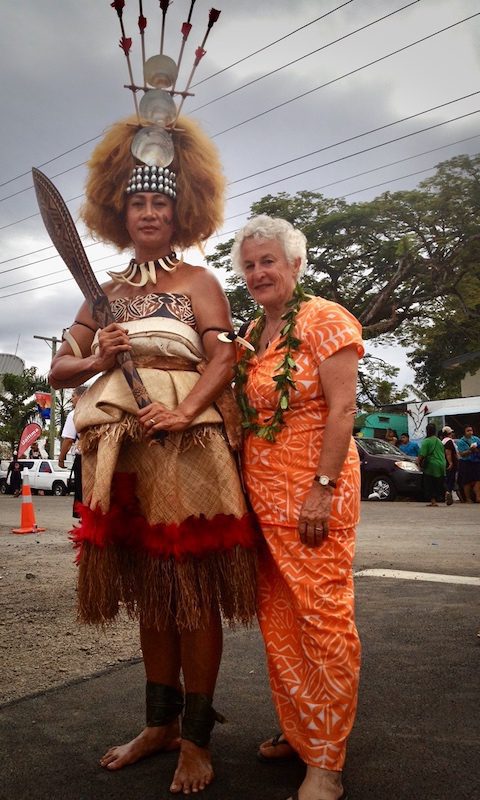
2012 Samoa with Zita Martel, hereditary chief, Polynesian Xplorer on Independence Day
What’s the biggest misunderstanding about regenerative tourism?
Because regeneration involves such a deep change in our thinking, it’s hard to grasp and most of us want simple definition or soundbites. One of the aspects that people caught onto is that regenerative tourism is simply about leaving a place better than you found it and that the onus of responsibility lies with the traveller not the host.
But what right have visitors to tell the community they are visiting what’s best for them? What conceit enables us to describe our visit as a force for good?
As a traveller, the most important thing you can do is to make sure that you are awake and fully engaged in a place, sensitive to and respectful of its uniqueness, and use the experience of being in a completely different culture, landscape or economy to enrich you and the persons making your experience possible. Whether you are getting into a taxi , checking in at the hotel or queuing for a seat at a popular restaurant, be aware that you are a guest in someone else’s home, not just a consumer with rights.
If there are ways in which, the host community identifies where you could make an additional contribution, then that’s fine. But do not get off the plane thinking, “I’ve got to do good in this place”. That is a very subtle and utterly dangerous form of colonialization. If travel is to be a force for good then each encounter provides both parties – guest and host – with the opportunity to experience the deep connection and oneness that’s expressed in a reciprocal, respectful exchange.
Does this all start with a change in mindset?
What is a mindset? Other words for it include worldview, perspective or paradigm. All of these words are being banded around like, confetti, without knowing what they mean.
The way I explain mindset is that it represents the bundle of assumptions about how the world works that we have learned as we grew up from our parents, from our society around us, from each other, from school. Some we’ve absorbed consciously, others subliminally. This bundle is a form of programming that shapes our choices, values and behaviour.
One assumption, for example, is that we all have to compete. It’s dominant everywhere even among regenerative practitioners. And why do we have to compete? Apparently, because it’s a tough world out there and there’s only so much to go around and we have to make sure that we take care of ourselves and our families first.
Most indigenous communities, and I experienced this directly in Western Canada, define success differently as the capacity to be generous and share. That’s what potlatches are all about. And then the colonialists came in, the white-skinned, the British, and said we can’t have any of that. That will upset the order of everything if it’s expected that, after accumulating all our wealth, we’re supposed to give it away.
But for Indigenous people the sign of wealth/success is that you can give it away. They don’t have a sense of scarcity because life is about reciprocal flows and that as you give you receive.
If a mindset is a bundle of assumptions that affect your values, what you consider to be important, how you make choices, what you do with your life, then they lead to behaviour. It’s always in that sequence. Most people have not gone back and asked what are the assumptions that shape their behaviour. This ignorance results in a form of sleep walking.
Regeneration involves starting on the inside because the person you need to regenerate first is yourself. You are a system, the community you live in is a system, nature is a living system, the business you work in is a living system. Just think of your body, it’s doing its work while we’re talking. I mean you don’t tell the liver what to do. But it’s adjusting to the party you went to last night. It’s operating as a complete system contributing to the health of the whole that’s you. Every part of your body contributes to the health of you and is adjusting to the conditions that you’re consciously and unconsciously creating for it.
“You and I aren’t as separate as we think. What you do affects me, it just has. But that’s an obvious one. That every thought you have, every action you take is affecting the whole all the time.” — Anna Pollock
What values do you think are the most important for us to focus on?
While there are so many values, the most important powerful stem from understanding why we’re here – our purpose in life.
I think, we are here to express and love life in our own unique way. We’re here to develop our capacity to be a full human being, to evolve. All life has been evolving systematically year on year for 3.8 billion years. So, there’s a yearning in life to become something more than what it was.
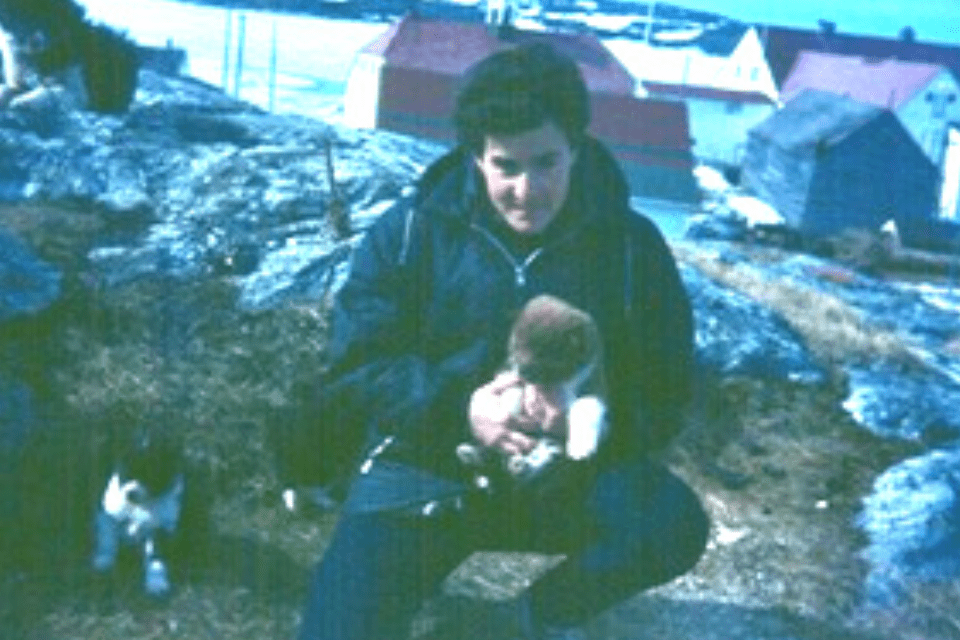
Anna in Hopedale Village, Labrador, 1967
And it’s that yearning to become, to evolve that enabled us to go from single-celled creatures in the sludge of a watery planet to, as someone said the other day, to enjoying a task or writing a symphony, or other great creative act. That’s evolution. And we are continuing to evolve.
And that’s why this point in history is so important, because we’re being asked to make the biggest evolutionary leap that humans have probably made since we stepped down from trees and started to walk on our two feet and develop a language. While that process took a long time – hundreds of thousands of years and was an unconscious process, we humans are now required to make such an evolutionary leap in less than a few decades, consciously, and that is a very tall order. The jury’s out whether we’ll make it or not. And this is not just what I’m saying, as there are hundreds of ordinary people as well as thought leaders from all walks of life, coming into this awareness. The way we do tourism needs to be shaped as a result and that is going to take collective effort and will.
How can women contribute to change?
Being willing to wake up and understand what’s really happening is a good place to start. The real problem is cultural – deeply cultural. We’re imprisoned not just by patterns of thinking that no longer serve us but the assumption this pattern is the only pattern. That’s why travelling with an inquisitive open mind can help wake us up to other ways of seeing and being.
We need to start talking openly together about what is really happening – start conversations, stop pretending, open our eyes, be willing to ask very difficult questions.
Women have a key role to play because change will come by seeing, learning and working together. Change is going to happen at the community level shaped by the nature of each place. Women are natural community builders and enablers. The first step is personal – to become aware of ourselves – what excites passion and commitment within; step two is to become clear about our individual strengths and gifts; and then to see opportunities to contribute those gifts to what’s needed at the time and place we find ourselves.
Every one of us has a unique role to play that’s related to our own, what we care about and love doing. We don’t all have to become another Jane Goodall or CEO of a multi-national. That may happen for some people. But we do each have to acknowledge that IF we continue on the path we’re on we’re in deep trouble so it’s up to each one of us to play our part in changing direction.
Travel will continue to play an important role socially, culturally and economically but only if it pays its way, covers the costs and generates net benefit. Even though we’re in the travel business, there is no Nirvana out there, there’s no set of solutions on the other side of a plane ticket. Sometimes we awaken fastest and deepest when we learn to see the everyday, close to home, with fresh eyes. Having done that, we’ll develop the capability to truly see and embrace to novel experiences associated with the far away, the novel and exotic.
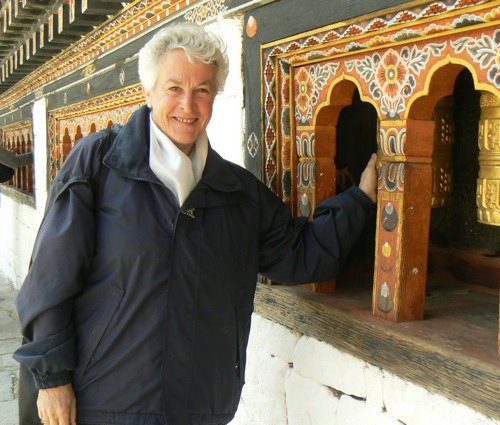
Anna in Bhutan, 2012 (PATA Trade Fair)
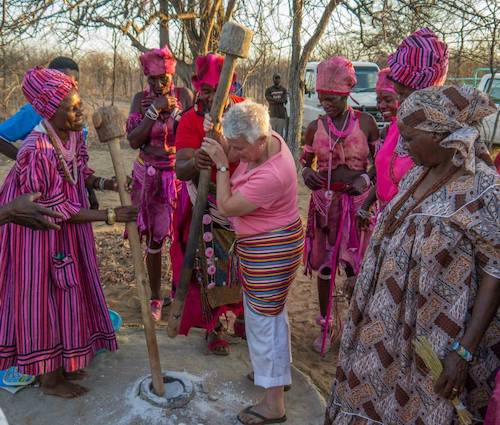
Learning to grind salt, Namibia 2013 / Photo by Lennart Pittja
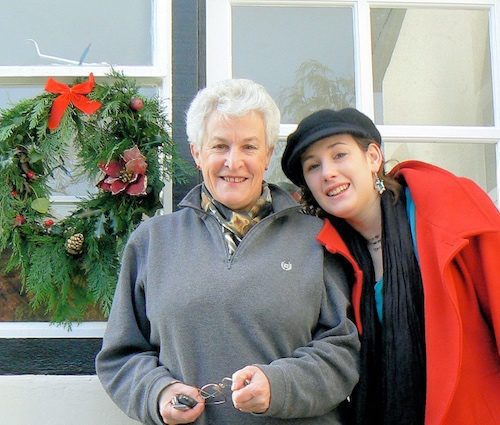
Anna and her daughter in the UK, 2009
Is there anything we should stop doing?
I think taking frivolous trips, just for the sheer sake of taking a trip, is probably not a good idea.
We should very much look at the way we consume stuff. Obviously, the more become aware of what we’re eating, what we’re buying, where it came from, and whether there are alternatives.
We must stop taking anything for granted anymore. And stop needing to be right. There are no single solutions.
In a situation of such deep change and chronic uncertainty, a wide diversity of perspective is needed. Focus on modelling the behaviours that generate the positive outcomes you seek. If they serve the whole, they’ll be copied.
We must stop assuming our political and corporate leaders will sort things out. Many have obtained political power and influence by exercising the competitive, self-serving values generated by the old mindset. As long as you’re asking “what’s needed now?”, then “how can I best contribute to meeting that need using the unique talents and gifts I possess?” then you will be on the right track.
The best action is to join up with other women, which is why I really like what you’re doing at Wanderful and JourneyWoman. I do think that we need to support on another. Because the next thing we are being asked to do is to say, “Enough is enough” Yes, we’re all going to have to change. It’s tough. We can do it. We’re not going to be told that we can’t do it anymore.
To learn more: Anna shares her thoughts and articles on both Linkedin and Medium. Her website www.conscious.travel is being transformed into a resource on regenerative tourism and will be published later in 2022.
More on Sustainable Travel
15 Stunning Train Trips to Inspire Your Travels in 2025
These train trips across Europe, Asia, Africa and Canada remind us that the journey can be more memorable than the destination.
Travel with Purpose: Volunteering at a Turtle Conservation Project in Costa Rica Makes My Dream Real
As a volunteer on a turtle conservation project in Costa Rica with Conservation VIP, I fulfilled a long-held dream to help baby turtles.
Transforming an Abandoned Quarry Into a Vineyard: A Story of Sustainability in Mallorca
On the wine-producing island of Mallorca, Spain, entrepreneur Virginia Pones is bringing an abandoned quarry back to life as a winery, reviving her husband’s family business.

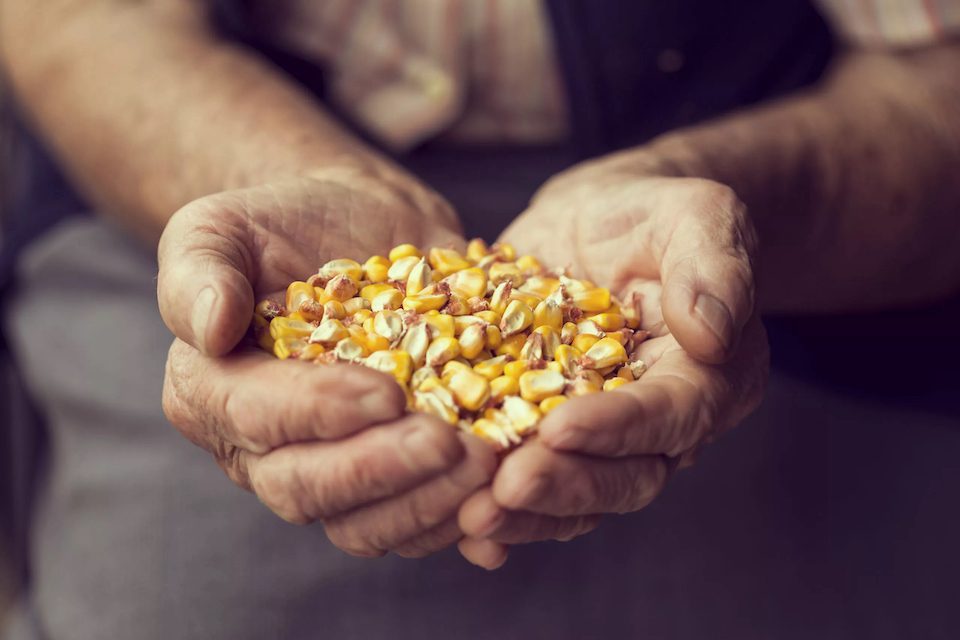

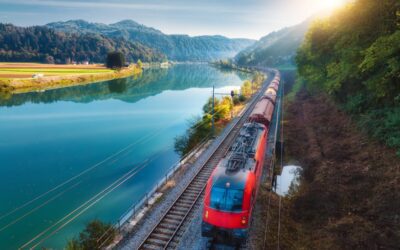

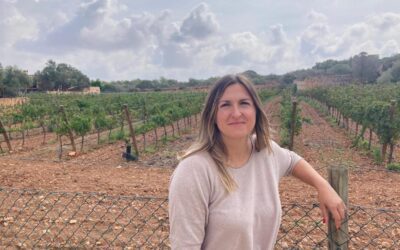
0 Comments
We always strive to use real photos from our own adventures, provided by the guest writer or from our personal travels. However, in some cases, due to photo quality, we must use stock photography. If you have any questions about the photography please let us know.
Disclaimer: We are so happy that you are checking out this page right now! We only recommend things that are suggested by our community, or through our own experience, that we believe will be helpful and practical for you. Some of our pages contain links, which means we’re part of an affiliate program for the product being mentioned. Should you decide to purchase a product using a link from on our site, JourneyWoman may earn a small commission from the retailer, which helps us maintain our beautiful website. JourneyWoman is an Amazon Associate and earns from qualifying purchases. Thank you!
We want to hear what you think about this article, and we welcome any updates or changes to improve it. You can comment below, or send an email to us at [email protected].